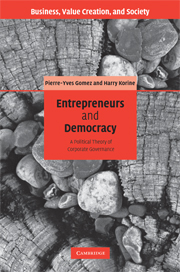Book contents
- Frontmatter
- Contents
- List of figures and tables
- Foreword
- Introduction
- Part I Establishing the ideological foundations: the contribution of liberal political philosophy
- Part II Understanding how corporate governance evolves: the contribution of history
- Part III Corporate governance and performance: the contribution of economics
- Conclusion to Part III
- Epilogue
- Index
Introduction
Published online by Cambridge University Press: 22 September 2009
- Frontmatter
- Contents
- List of figures and tables
- Foreword
- Introduction
- Part I Establishing the ideological foundations: the contribution of liberal political philosophy
- Part II Understanding how corporate governance evolves: the contribution of history
- Part III Corporate governance and performance: the contribution of economics
- Conclusion to Part III
- Epilogue
- Index
Summary
‘What gives the right to direct a corporation?’ This question is at the heart of corporate governance. It is also of central concern to the millions of citizens whose lives depend upon the fate of business corporations. The rules, institutions, and practices of corporate governance define the limits of the power to direct and determine under what conditions this power is acceptable. In our sense, to direct means to exercise an entrepreneurial force that impacts the entire corporation, giving it an orientation and laying the foundations for its long-term survival. The legitimacy of exercising this force in the name of the corporation is not automatically assured, but is rather a subject of rules and limits. Corporate governance is the definition of these constraints.
As befits a subject with implications for many spheres of human activity, the study of corporate governance draws on a wide variety of disciplines. In spite of, or perhaps precisely because of its broad grounding, the field, in our view, lacks a coherent, holistic vision that would make it possible to pull together the different strands of inquiry. The more research is done, the stronger this impression becomes, because the three principal disciplinary axes along which research is moving – economics, history, and political philosophy – do not speak to each other and are not compatible in terms of approach and methodology.
However erroneously, the primary voice in the study of corporate governance is often considered, today, to be economics, more particularly financial economics.
- Type
- Chapter
- Information
- Entrepreneurs and DemocracyA Political Theory of Corporate Governance, pp. 1 - 12Publisher: Cambridge University PressPrint publication year: 2008



